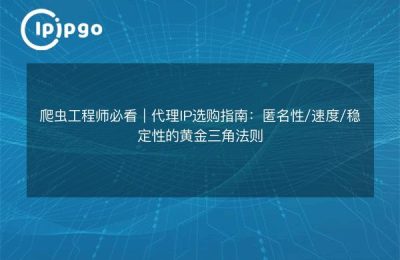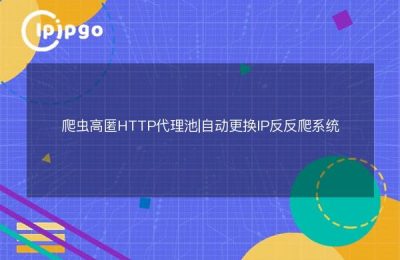
In today's Internet era, crawler technology has become an important means of data acquisition. However, in the face of the complex network environment, the choice of proxy IP is particularly important. Today we will talk about the common types of proxies for crawlers, to help you easily deal with a variety of network challenges.
What is a proxy IP?
Proxy IP, as the name suggests, is a "bridge" between you and the target server. Through proxy IP, you can hide your real IP address, so as to avoid being blocked or restricted by the target website. Proxy IP has a wide range of applications, especially in web crawlers, it is an indispensable tool.
Common Types of Proxies
There are many different types of proxy IPs. Here are a few common types of proxies:
1. HTTP proxy
HTTP proxy is one of the most common types of proxies and is mainly used to handle HTTP requests. It caches web pages, speeds up access, and also filters advertisements and malicious content. However, HTTP proxies are less secure and can be easily detected and blocked.
2. HTTPS proxy
HTTPS proxy adds encryption to HTTP proxy to better secure data transmission. It is suitable for scenarios that require a high degree of privacy protection, such as online payments and sensitive information transmission.
3. SOCKS Agent
SOCKS Proxy is a low-level proxy protocol capable of handling various types of traffic, including HTTP, HTTPS, FTP, and more. Its flexibility and versatility make it ideal for web crawlers. However, the SOCKS proxy is relatively complex to set up and requires a certain technical foundation to use.
4. Transparent agents
Transparent proxy plays the role of "invisibility" between the user and the target server, and the user can use it without additional settings. Although transparent proxies are easy to use, they cannot hide the user's real IP address and are less secure.
5. Anonymous agents
Anonymizing proxies protect user privacy by hiding the user's real IP address. Depending on the level of anonymity, anonymizing proxies are categorized into high anonymity proxies and normal anonymity proxies. High anonymity proxies are able to completely hide the user's identity, while normal anonymity proxies expose some information.
How do I choose the right type of agent?
Choosing the right type of proxy depends largely on your specific needs and usage scenarios. Here are a few suggestions for selecting the right type:
1. Data acquisition
If you need to do large-scale data collection, it is recommended to choose high anonymity proxy or SOCKS proxy. These two proxies can effectively hide your real IP address and avoid being blocked by the target website.
2. Security requirements
If you have high security requirements for data transfer, you can choose HTTPS proxy. It encrypts data transmission and protects your privacy and sensitive information.
3. Speed of access
If you have high requirements for access speed, you can choose HTTP proxy or transparent proxy. They can cache web pages to speed up access and enhance user experience.
Tips for using proxy IPs
There are also some tips to help you better cope with network challenges when using proxy IPs:
1. Regular IP replacement
In order to avoid being blocked by the target website, it is recommended to change the proxy IP regularly. this can effectively spread the risk and improve the stability of the crawler.
2. Multi-IP Polling
By means of multi-IP polling, it is possible to switch between multiple proxy IPs in turn, further reducing the risk of being blocked. This approach is suitable for large-scale data collection and high-frequency access scenarios.
3. Quality proxy IP
Choosing a quality proxy IP service provider can ensure the stability and reliability of the proxy IP. A quality proxy IP is not only fast, but also effective in avoiding detection and blocking.
concluding remarks
The use of proxy IPs in web crawling should not be underestimated. By choosing the right type of proxy and using the right techniques, you can easily tackle various web challenges and get the data you need. I hope today's sharing can provide you some help on your web crawler's path and make your website crawling like a fish out of water.
Finally, remember to choose the quality proxy IP services we offer to help you navigate your way through data collection!








